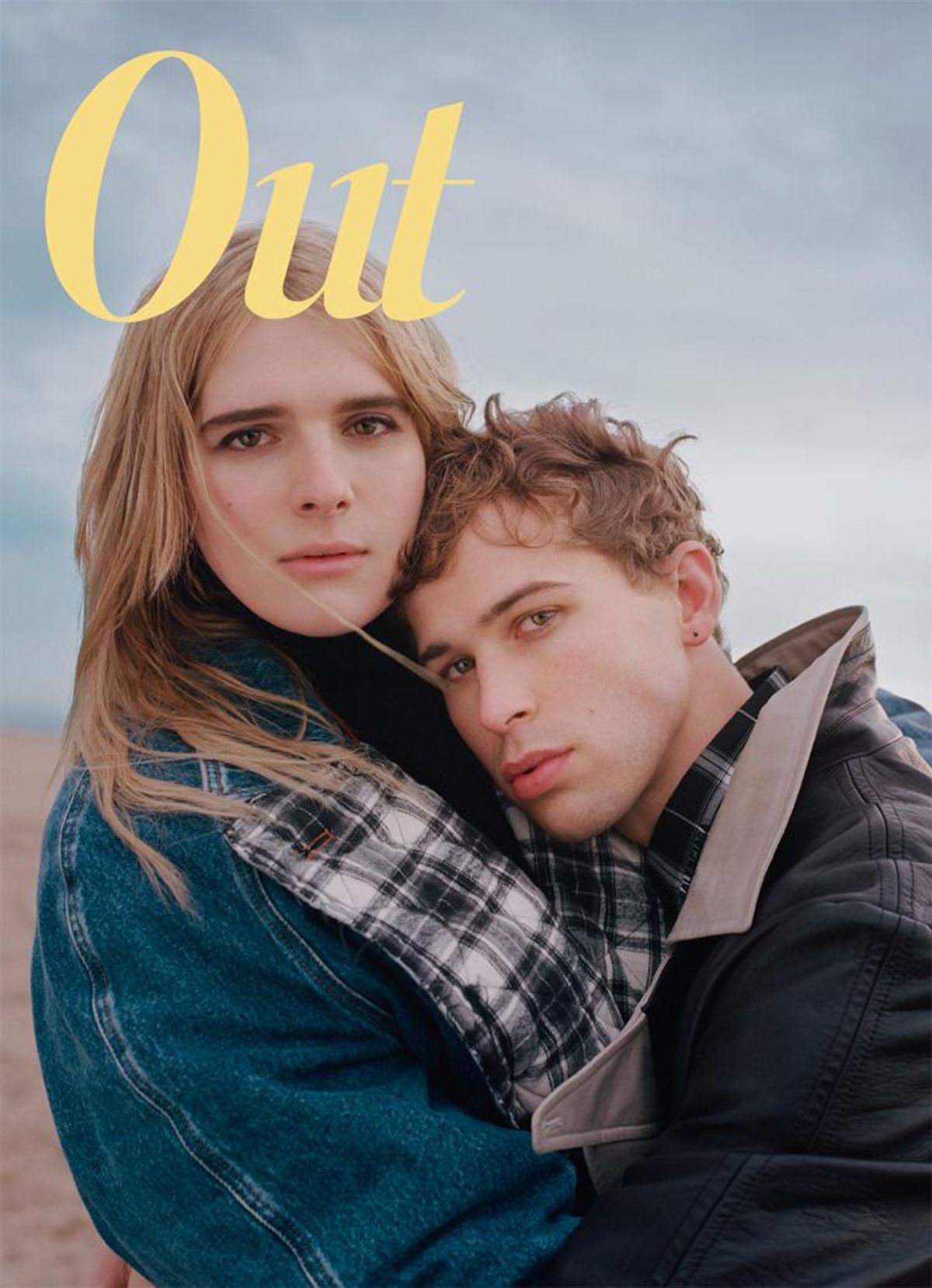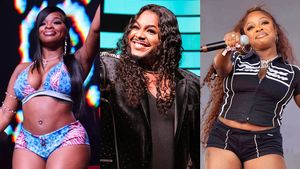It's kismet that Hari Nef and Tommy Dorfman would end up -- despite torrential downpours -- making the most of this photo shoot on a Venice beach. The two were introduced over a year ago through mutual friends, who had orchestrated a "fun beach day," which reached an untimely end when Nef answered a Skype call from her ex and was dumped on the spot. "Tommy met me at the worst possible moment," she says.
But that can only be partially true. Sometime after that encounter, the two bumped into each other while walking down the street in New York (which, every New Yorker knows, is a statistical anomaly reserved only for romantic comedies), had an impromptu breakfast at a diner (also something that only happens in romantic comedies), and then moved in together a month later (do you see where we're going with this?).
Unlike those other Hollywood couples, Hari Nef and Tommy Dorfman are here to stay (platonically, of course). After a banner year for both -- Dorfman ending his run on the hit Netflix series 13 Reasons Why, and Nef giving a star performance in Assassination Nation -- the best seems yet to come. Right before the duo prepared for two of their most exciting roles yet, they sat down to reflect on the year they shared together -- and all that's coming next.
Out: You're currently getting ready to move from Los Angeles -- where you live together -- back to New York for your run in the Jeremy O. Harris play Daddy. How does it feel to be heading back to the city?
Hari Nef: I'm excited to work in the city, and I'm excited to be near all of my friends who I miss so much. It does feel a little too soon for me to come back to New York -- I'm really loving L.A., but I wouldn't question this decision for a second.
Tommy Dorfman: I feel like I've barely planted my feet in Los Angeles, and we're about to hop back over. But after school, I really wanted to do a play but it just wasn't the right time, and I ended up sort of quickly working in television. With this play in particular -- I feel like it's the first time in my professional career that I'm going to be challenged by a role. 13 Reasons Why was great, because we had this familial experience and I was working consistently for months at a time. But you know, since then, and since not being on that show anymore, I'm excited to have that family unit that comes out of theater, out of creating something from the ground up together.
HN: Something that Jeremy planted in my head is that he's really adamant about sharing his work with his friends. You know, we were friends with him and he cast us in his show, and I've been with the show since the readings. It feels authentic.
TD: I feel like there's a new wave of artists that are coming up, and I don't know what the next 10, 15, 20 years are gonna be, but I know that we're all gonna be supportive, successful, and create work together. I can see our futures all entwining in the shows that we want to create, and the plays that we want to make, and movies we want to make together. And it's funny to just be at the beginning of our careers in that way.
HN: It's almost like a new form of achievement or prestige to aspire to. Instead of trying to be a movie star, on the cover of Vanity Fair, I feel a lot more comfortable aspiring to make really good work with my friends and have my friends be the institutional recognition that I aspire to.
TD: I feel very aligned with that. Instead of focusing all our time trying to break into some studio business, or convince whatever old crusty person that's been running the studio for decades to believe in me, why don't we just create our own work?
Out: It's interesting to hear you both talk about your experience in the industry this way because, from the outside looking in, you're both doing very well. Tommy, you were on one of the biggest Netflix shows of the past few years. And Hari, you just starred in the critically acclaimed Assassination Nation.
TD: I feel grateful for the work that I've been able to do in the short amount of time I've been in this industry, but I don't feel successful yet. 13 was this weird fluke phenomenon that I don't think I even knew I was plugged into at the time. For me, I was just like, "Holy shit! I'm out of school a year and I got a job!" Then when it ended, I didn't work for six months, and I didn't even audition because no one would see me. But then the show came out and I was like, "Oh shit, we're all stars!" But then I finally got a manager, and she was like, "Sweetie, you're a fucking baby, take a seat." And I realized, just because you have some type of notoriety, or a certain amount of Instagram followers from one job that happened to be prolific, that doesn't make you a successful actor or artist.
HN: From the outside looking in, people may perceive me as successful. Or you might perceive me as successful because Jill Soloway, Alessandro Michele, Sam Levinson, and Lena Dunham were like, "Hey, she can do stuff and we're giving her a platform." And I love all of those people, and I'm really grateful to them. However, I would like to feel in control of my work, and I want to be creatively responsible for myself. I don't want to be beholden to other people to tell me that I am good, or that I am competent. I don't want to be beholden to other people to give me the permission to do what I want to do. I just want to be able to do it. That may be a really tall order, but that is my new measure of success.
To read more, grab your own copy of Out on Kindle, Nook and Zinio today, and on newsstands January 22. Preview more of the issue here. Get a year's subscription for $19.95.





















































































